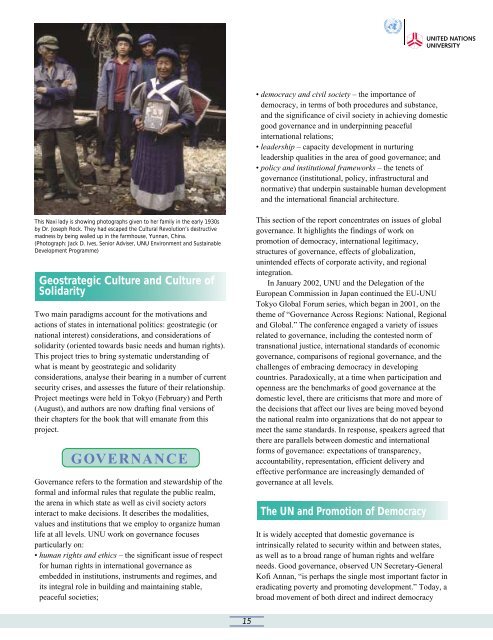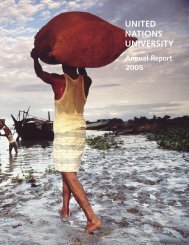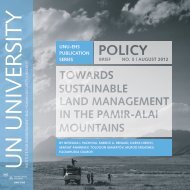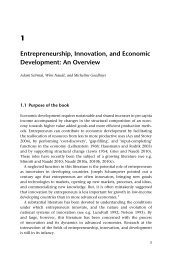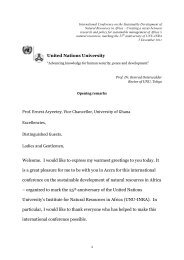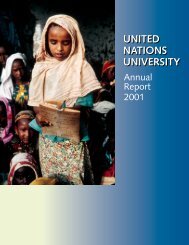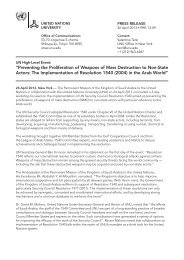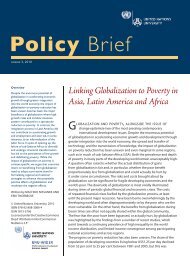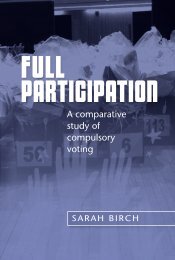Environment and Sustainable Development - United Nations ...
Environment and Sustainable Development - United Nations ...
Environment and Sustainable Development - United Nations ...
You also want an ePaper? Increase the reach of your titles
YUMPU automatically turns print PDFs into web optimized ePapers that Google loves.
• democracy <strong>and</strong> civil society – the importance of<br />
democracy, in terms of both procedures <strong>and</strong> substance,<br />
<strong>and</strong> the significance of civil society in achieving domestic<br />
good governance <strong>and</strong> in underpinning peaceful<br />
international relations;<br />
• leadership – capacity development in nurturing<br />
leadership qualities in the area of good governance; <strong>and</strong><br />
• policy <strong>and</strong> institutional frameworks – the tenets of<br />
governance (institutional, policy, infrastructural <strong>and</strong><br />
normative) that underpin sustainable human development<br />
<strong>and</strong> the international financial architecture.<br />
This Naxi lady is showing photographs given to her family in the early 1930s<br />
by Dr. Joseph Rock. They had escaped the Cultural Revolution’s destructive<br />
madness by being walled up in the farmhouse, Yunnan, China.<br />
(Photograph: Jack D. Ives, Senior Adviser, UNU <strong>Environment</strong> <strong>and</strong> <strong>Sustainable</strong><br />
<strong>Development</strong> Programme)<br />
Geostrategic Culture <strong>and</strong> Culture of<br />
Solidarity<br />
Two main paradigms account for the motivations <strong>and</strong><br />
actions of states in international politics: geostrategic (or<br />
national interest) considerations, <strong>and</strong> considerations of<br />
solidarity (oriented towards basic needs <strong>and</strong> human rights).<br />
This project tries to bring systematic underst<strong>and</strong>ing of<br />
what is meant by geostrategic <strong>and</strong> solidarity<br />
considerations, analyse their bearing in a number of current<br />
security crises, <strong>and</strong> assesses the future of their relationship.<br />
Project meetings were held in Tokyo (February) <strong>and</strong> Perth<br />
(August), <strong>and</strong> authors are now drafting final versions of<br />
their chapters for the book that will emanate from this<br />
project.<br />
GOVERNANCE<br />
Governance refers to the formation <strong>and</strong> stewardship of the<br />
formal <strong>and</strong> informal rules that regulate the public realm,<br />
the arena in which state as well as civil society actors<br />
interact to make decisions. It describes the modalities,<br />
values <strong>and</strong> institutions that we employ to organize human<br />
life at all levels. UNU work on governance focuses<br />
particularly on:<br />
• human rights <strong>and</strong> ethics – the significant issue of respect<br />
for human rights in international governance as<br />
embedded in institutions, instruments <strong>and</strong> regimes, <strong>and</strong><br />
its integral role in building <strong>and</strong> maintaining stable,<br />
peaceful societies;<br />
This section of the report concentrates on issues of global<br />
governance. It highlights the findings of work on<br />
promotion of democracy, international legitimacy,<br />
structures of governance, effects of globalization,<br />
unintended effects of corporate activity, <strong>and</strong> regional<br />
integration.<br />
In January 2002, UNU <strong>and</strong> the Delegation of the<br />
European Commission in Japan continued the EU-UNU<br />
Tokyo Global Forum series, which began in 2001, on the<br />
theme of “Governance Across Regions: National, Regional<br />
<strong>and</strong> Global.” The conference engaged a variety of issues<br />
related to governance, including the contested norm of<br />
transnational justice, international st<strong>and</strong>ards of economic<br />
governance, comparisons of regional governance, <strong>and</strong> the<br />
challenges of embracing democracy in developing<br />
countries. Paradoxically, at a time when participation <strong>and</strong><br />
openness are the benchmarks of good governance at the<br />
domestic level, there are criticisms that more <strong>and</strong> more of<br />
the decisions that affect our lives are being moved beyond<br />
the national realm into organizations that do not appear to<br />
meet the same st<strong>and</strong>ards. In response, speakers agreed that<br />
there are parallels between domestic <strong>and</strong> international<br />
forms of governance: expectations of transparency,<br />
accountability, representation, efficient delivery <strong>and</strong><br />
effective performance are increasingly dem<strong>and</strong>ed of<br />
governance at all levels.<br />
The UN <strong>and</strong> Promotion of Democracy<br />
It is widely accepted that domestic governance is<br />
intrinsically related to security within <strong>and</strong> between states,<br />
as well as to a broad range of human rights <strong>and</strong> welfare<br />
needs. Good governance, observed UN Secretary-General<br />
Kofi Annan, “is perhaps the single most important factor in<br />
eradicating poverty <strong>and</strong> promoting development.” Today, a<br />
broad movement of both direct <strong>and</strong> indirect democracy<br />
15


